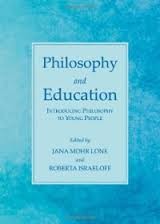Are children natural philosophers? They are curious about the mysteries of the human experience and about questions such as the meaning and purpose of being alive and whether we can know anything at all. Philosophy and Education: Introducing Philosophy to Young People seeks to illuminate the ways in which philosophy can strengthen and deepen K-12 education. The book examines various issues involved in teaching philosophy to young people at different grade levels, including assessing what teachers need in order to teach philosophy in schools and describing several models for introducing philosophy into schools. Ways to inspire young students to explore specific branches of philosophy - ethics, epistemology, metaphysics, aesthetics, and logic - through literature, thought experiments, and games and activities, as well as traditional philosophy texts, are described. The book's final section considers student assessment and program evaluation, and analyzes the contributions pre-college philosophy can make to education in general. Teachers and educators - and parents - all want young people to grow up with the skills they need to pursue their own goals and become productive and successful adults. Thinking independently and reasoning clearly are central to these objectives. Philosophy helps students develop some of the analytic skills they need to engage in thoughtful decision-making throughout their lives, and the richness of the questions involved can help young people maintain their awareness of the world as marvelous and mysterious.

